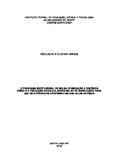O Programa Institucional de Bolsa de Iniciação à Docência (PIBID) e a produção da calculadora solar de baixo custo para uso em atividades experimentais nas aulas de física

Visualizar/
Data
2017-12-14Autor
Barros, Nícolas Kelp Oliveira
http://lattes.cnpq.br/6811495063821189
Metadado
Mostrar registro completoResumo
This work of course completion proposes the use of low cost material (solar
calculator), as methodology teaching the content of Modern Physics, more
specifically the theme "photoelectric effect". We developed the idea after our
participation in the Institutional Program of Scholarship for Teaching Initiation
(PIBID), a program of the Coordination for the Improvement of Higher Education
Personnel (CAPES), in which we were scholarship holders during the graduation
years. Therefore, we contextualize with the history of CAPES and PIBID,
emphasizing the importance of the program for the adaptation of students to the real
world of classrooms in our country. Soon after we did a bibliographical research on
the subject photoelectric effect, from Hertz to Compton and we deal with the subject
making an approach focused on the conceptual issues to the detriment of the
mathematical language. Our goal was to get students to appropriate these concepts
and understand the workings of this technology through a low cost experiment, giving
them the opportunity to build and develop their own concepts beyond understanding
the subject. We conclude with a proposal of Didactic Unit, where we suggest how
teachers can use the experiment of the solar calculator of low cost, as another way to
diversify the classes of Physics.
Keywords: Modern physics. Photoelectric Effect, Degree in Physics. Solar
calculator.



